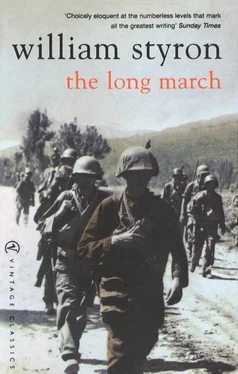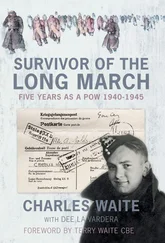William Styron - The Long March
Здесь есть возможность читать онлайн «William Styron - The Long March» весь текст электронной книги совершенно бесплатно (целиком полную версию без сокращений). В некоторых случаях можно слушать аудио, скачать через торрент в формате fb2 и присутствует краткое содержание. Город: New York, Год выпуска: 1952, ISBN: 1952, Издательство: Vintage Classics, Жанр: prose_military, на английском языке. Описание произведения, (предисловие) а так же отзывы посетителей доступны на портале библиотеки ЛибКат.
- Название:The Long March
- Автор:
- Издательство:Vintage Classics
- Жанр:
- Год:1952
- Город:New York
- ISBN:978-0099422792
- Рейтинг книги:3 / 5. Голосов: 1
-
Избранное:Добавить в избранное
- Отзывы:
-
Ваша оценка:
- 60
- 1
- 2
- 3
- 4
- 5
The Long March: краткое содержание, описание и аннотация
Предлагаем к чтению аннотацию, описание, краткое содержание или предисловие (зависит от того, что написал сам автор книги «The Long March»). Если вы не нашли необходимую информацию о книге — напишите в комментариях, мы постараемся отыскать её.
The Long March — читать онлайн бесплатно полную книгу (весь текст) целиком
Ниже представлен текст книги, разбитый по страницам. Система сохранения места последней прочитанной страницы, позволяет с удобством читать онлайн бесплатно книгу «The Long March», без необходимости каждый раз заново искать на чём Вы остановились. Поставьте закладку, и сможете в любой момент перейти на страницу, на которой закончили чтение.
Интервал:
Закладка:
He would stay awake. And he thought of Mannix. Because Mannix would laugh. Mannix appreciated the idiocy of those radio words, just as in his own crazy way he managed to put his finger on anything which might represent a symbol of their predicament. Like the radio code. He had a violent contempt for the gibberish, the boy-scout passwords which replaced ordinary conversation in the military world. To Mannix they were all part of the secret language of a group of morons, morons who had been made irresponsibly and dangerously clever. He had despised the other side, also—the sweat, the exertion, and the final danger. It had been he, too, who had said, “None of this Hemingway crap for me, Jack”; he was nobody’s lousy hero, and he’d get out of this outfit some way. Yet, Culver speculated, who really was a hero anyway, any more? Mannix’s disavowal of faith put him automatically out of the hero category, in the classical sense, yet if suffering was part of the hero’s role, wasn’t Mannix as heroic as any? On his shoulder there was a raw, deeply dented, livid scar, made the more conspicuous and, for that matter, more ugly, by the fact that its evil slick surface only emphasized the burly growth of hair around it. There were smaller scars all over his body. About them Mannix was neither proud nor modest, but just frank, and once while they were showering down after a day in the field, Mannix told him how he had gotten the scars, one day on Peleliu. “I was a buck sergeant then. I got pinned down in a shell hole out in front of my platoon. Christ knows how I got there but I remember there was a telephone in the hole and—whammo! —the Nips began laying in mortar fire on the area and I got a piece right here.” He pointed to a shiny, triangular groove just above his knee. “I remember grabbing that phone and hollering for them to for Christ’s sake get the 81s up and knock out that position, but they were slow, Jesus they were slow! The Nips were firing for effect, I guess, because they were coming down like rain and every time one of the goddam things went off I seemed to catch it. All I can remember is hollering into that phone and the rounds going off and the zinging noise that shrapnel made. I hollered for 81s and I caught a piece in my hand. Then I hollered for at least a goddam rifle grenade and I caught a piece in the ass, right here. I hollered for 60s and guns and airplanes. Every time I hollered for something I seemed to catch some steel. Christ, I was scared. And hurting! Jesus Christ, I never hurt so much in my life. Then I caught this one right here”—he made a comical, contorted gesture, with a bar of soap, over his shoulder—“man, it was lights out then. I remember thinking, ‘Al, you’ve had it,’ and just before I passed out I looked down at that telephone. You know, that frigging wire had been blasted right out of sight all that time.”
No, perhaps Mannix wasn’t a hero, any more than the rest of them, caught up by wars in which, decade by half-decade, the combatant served peonage to the telephone and the radar and the thunderjet—a horde of cunningly designed, and therefore often treacherous, machines. But Mannix had suffered once, that “once” being, in his own words, “once too goddam many, Jack.” And his own particular suffering had made him angry, had given him an acute, if cynical, perception about their renewed bondage, and a keen nose for the winds that threatened to blow up out of the oppressive weather of their surroundings and sweep them all into violence. And he made Culver uneasy. His discontent was not merely peevish; it was rocklike and rebellious, and thus this discontent seemed to Culver to be at once brave and somehow full of peril.
He had first seen Mannix the revolutionary five months ago, soon after they had been called back to duty. He hadn’t known him then. There were compulsory lectures arranged at first, to acquaint the junior officers with recent developments in what had been called “the new amphibious doctrine.” The outlines of these lectures were appallingly familiar: the stuffy auditorium asprawl with bored lieutenants and captains, the brightly lit stage with its magnified charts and graphs, the lantern slides (at which point, when the lights went out, it was possible to sneak a moment’s nap, just as in officers’ school seven years ago), the parade of majors and colonels with their maps and pointers, and their cruelly tedious, doggedly memorized lectures: the whole scene, with its grave, professorial air, seemed seedily portentous, especially since no one cared, save the majors and colonels, and no one listened. When Culver sat down, during the darkness of a lantern slide, next to the big relaxed mass which he dimly identified as a captain, he noticed that it was snoring. When the lights went up, Mannix still slept on, filling the air around him with a loud, tranquil blubber. Culver aroused him with a nudge. Mannix grumbled something, but then said, “Thanks, Jack.” A young colonel had come onto the stage then. He had made many of the lectures that week. He had a curiously thick, throaty voice which would have made him sound like a yokel, except that his words were coolly, almost passionately put, and he bent forward over the lectern with a bleak and solemn attitude—a lean, natty figure with hair cut so close to his head that he appeared to be, from that distance, nearly bald. “An SS man,” Mannix whispered, “he’s gonna come down here and cut your balls off. You Jewish?” He grinned and collapsed back, forehead against his hand, into quiet slumber. Culver couldn’t recall what the colonel talked about: the movement of supplies, logistics, ship-to-shore movement, long-range planning, all abstract and vast, and an ardent glint came to his eyes when he spoke of the “grandiose doctrine” which had been formulated since they, the reserves, had been away. “You bet your life,
“Jack,” Mannix had whispered out of the shadows then. He seemed to have snapped fully awake and, following the lecture intently, he appeared to address his whispers not to Culver, or the colonel, but to the air. “You bet your life they’re grandiose,” he said, “even if you don’t know what grandiose means. I’ll bet you’d sell your soul to be able to drop a bomb on somebody.” And then, aping the colonel’s instructions to the corporal—one of the enlisted flunkies who, after each lecture, passed out the reams of printed and mimeographed tables and charts and resumes, which everyone promptly, when out of sight, threw away—he whispered in high, throaty, lilting mockery: “Corporal, kindly pass out the atom bombs for inspection.” He smacked the arm of his seat, too hard; it could be heard across the auditorium, and heads turned then, but the colonel had not seemed to have noticed. “Jesus,” Mannix rumbled furiously, “Jesus Christ almighty,” while the colonel droned on, in his countrified voice: “Our group destiny,” he said, “amphibiously integrated, from any force thrown against us by Aggressor enemy.”
Later—toward the end of that week of lectures, after Mannix had spoken the calm, public manifesto which at least among the reserves had made him famous, and from then on the object of a certain awe, though with a few doubts about his balance, too—Culver had tried to calculate how he had gotten by with it. Perhaps it had to do with his size, his bearing. There was at times a great massive absoluteness in the way he spoke. He was huge, and the complete honesty and candor of his approach seemed to rumble forth, like notes from a sounding board, in direct proportion to his size. He had suffered, too, and this suffering had left a persistent, un-whipped, scornful look in his eyes, almost like a stain, or rather a wound, which spells out its own warning and cautions the unwary to handle this tortured parcel of flesh with care. And he was an enormous man, his carriage was formidable. That skinny, bristle-haired colonel, Culver finally realized, had been taken aback past the point of punishment, or even reprimand, merely because of the towering, unavoidable, physical fact that he was facing not a student or a captain or a subordinate, but a stubborn and passionate man. So it was that, after a lecture on transport of supplies, when the colonel had called Mannix’s name at random from a list to answer some generalized, hypothetical question, Mannix had stood up and said merely, “I don’t know, sir.” A murmur of surprise passed over the auditorium then, for the colonel, early in the hour, had made it plain that he had wanted at least an attempt at an answer—a guess—even though they might be unacquainted with the subject. But Mannix merely said, “I don’t know, sir,” while the colonel, as if he hadn’t heard correctly, rephrased the question with a little tremor of annoyance. There was a moment’s silence and men turned around in their seats to look at the author of this defiance. “I don’t know, sir,” he said again, in a loud but calm voice. “I don’t know what my first consideration would be in making a space table like that. I’m an infantry officer. I got an 0302.” The colonel’s forehead went pink under the glare of the lights. “I stated earlier, Captain, that I wanted some sort of answer. None of you gentlemen is expected to know this subject pat, but you can essay some kind of an answer.” Mannix just stood there, solid and huge, blinking at the colonel. “I just have to repeat, sir,” he said finally, “that I don’t have the faintest idea what my first consideration would be. I never went to cargo-loading school. I’m an 0302. And I’d like to respectfully add, sir, if I might, that there’s hardly anybody in this room who knows that answer, either. They’ve forgotten everything they ever learned seven years ago. Most of them don’t even know how to take an M-l apart. They’re too old. They should be home with their family.” There was passion in his tone but it was controlled and straightforward—he had managed to keep out of his voice either anger or insolence—and then he fell silent. His words had the quality, the sternness, of an absolute and unequivocal fact, as if they had been some intercession for grace spoken across the heads of a courtroom by a lawyer so quietly convinced of his man’s innocence that there was no need for gesticulations or frenzy. The colonel’s eyes bulged incredulously at Mannix from across the rows of seats, but in the complete, astounded hush that had followed he was apparently at a loss for words. A bit unsteadily, he called out another name and Mannix sat down, staring stonily ahead.
Читать дальшеИнтервал:
Закладка:
Похожие книги на «The Long March»
Представляем Вашему вниманию похожие книги на «The Long March» списком для выбора. Мы отобрали схожую по названию и смыслу литературу в надежде предоставить читателям больше вариантов отыскать новые, интересные, ещё непрочитанные произведения.
Обсуждение, отзывы о книге «The Long March» и просто собственные мнения читателей. Оставьте ваши комментарии, напишите, что Вы думаете о произведении, его смысле или главных героях. Укажите что конкретно понравилось, а что нет, и почему Вы так считаете.






![Джеффри Арчер - The Short, the Long and the Tall [С иллюстрациями]](/books/388600/dzheffri-archer-the-short-the-long-and-the-tall-s-thumb.webp)





